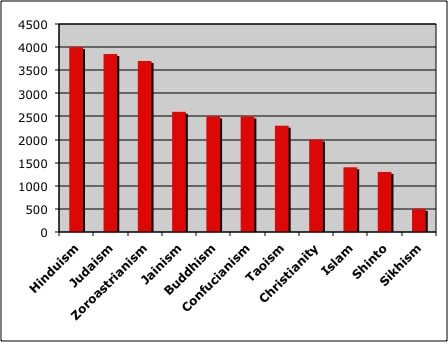Today (as I write, Wednesday, October 24), millions of Muslims from all over the world are arriving in the holy city of Mecca, in Saudi Arabia. They are converging upon this holiest of Islamic holy cities on the eve of the annual period set aside each year to accommodate the millions of Muslim pilgrims who converge here each year in order to fulfill one of the mandatory “Five Pillars” of Islam: the Hajj, or pilgrimage to Mecca.
This pilgrimage is a mandatory religious duty, which must be completed at least once in the lifetime of every Muslim who is both physically and financially able to make the journey. This year (2012), some 3.4 million pilgrims are expected to attend.
The Hajj (Arabic for “pilgrimage”) occurs each year during the twelfth and final month of the Islamic calendar, a month referred to by its Arabic name of Dhu al-Hijjah. More narrowly, the precise period of time which is specifically set aside during this month to accommodate the annual pilgrimage runs from the 8th to the 12th days of Dhu al-Hijjah.
On the Western (or Gregorian) calendar for 2012, tomorrow — Thursday, October 25 — corresponds to the Islamic calendar’s 8th day of Dhu al-Hijjah. So, it is tomorrow that the five-day Hajj itself will formally begin.
The Islamic calendar, unlike the Western Gregorian calendar, is a lunar calendar. Because of differences in the lengths of months, and in precisely when months begin and end, there is a certain amount of inbuilt “drift” between the two calendars; their respective months are not always in sync with each other.
This means that Islamic calendar months, such as the month of Ramadan or the month of Dhu al-Hijjah, do not always correspond to the same days or months each year on the Gregorian calendar. Last year, for example, the month of the Hajj (Dhu al-Hijjah) fell upon Oct 28 through Nov 25, 2011. Next year, by contrast, the month of the Hajj will occur Oct 6 through Nov 4, 2013.
This year, however, the lunar month of Dhu al-Hijjah will coincide with October 17 through November 14, 2012. And the specific five-day Hajj period itself will run October 25 – 29, 2012. (Last year, due to Gregorian/Islamic calendar “drift,” the Hajj ran November 4 – 7, 2011)
During this brief time frame, over three million Muslim pilgrims from around the globe will participate in one of the world’s largest religious pilgrimages. Islam’s holy prophet Muhammad himself performed the Hajj, but the roots of this ritual pilgrimage at Mecca are also believed by Muslims to stretch all the way back to the time of the ancient patriarch Abraham.
For Muslims, this once-in-a-lifetime pilgrimage experience is a profound, deeply moving, even life-changing event. For additional specific details on the nature of the Hajj itself and what it consists of, please refer to my special article entitled “The Hajj: Pilgrimage to Mecca,” currently featured on the Beliefnet.com home page.

